人教版高中英语选修七教案:B7-U2-P4备课单.doc
人教版高中英语选修七全册教案

Unit 1 Living well知识目标1.Get students to learn the useful words and expressions in this unit.eyesight,ambition,disabled,beneficial,in other words,clumsy,adapt,microscope,out of breath,absence,stupid,fellow,annoyed,all in all,industry,tank,make fun of,encouragement,adapt to 2.Help students to learn about disabilities and life of the disabled.能力目标1.Let students read the passage Marty's Story to develop their reading ability.2.Enable students to know that people with disabilities can also live well.情感目标1.By talking about disabilities and life of the disabled,make sure students can learn some positive stories of the disabled.2.Help them understand more about how challenging life can be for the disabled.3.Develop students' sense of cooperative learning.教学重点Get students inspired by positive stories of the people with disabilities.教学难点1.Develop students' reading ability.2.Help students understand the difficulties the disabled have to overcome.学情分析1.教学方法1.Task-based teaching and learning.2.Cooperative learning.教学过程Step 1Warming up1.Warming up by discussingFirst ask students to talk about people with a mental or physical disability to see how much they know about disabilities. Then show some photos of people with disabilities. Students will be asked to discuss the following questions in small groups.Do you know any famous people who are disabled?What difficulties do they have to overcome in daily life?What have they achieved?2.Warming up by talkingFirst,ask students to look at the pictures and read what these people have achieved even though they each have a disability. Next,work with partners to talk about what disability they might have according to each description below the picture.Step 2Pre-readingAsk students to read the short paragraph in Pre-reading carefully and find out the purpose of the website “Family Village”.Step 3Reading1.SkimmingGive students 2 minutes;ask them to read the passage fast to fill in the blanks:Sum up the main idea of each paragraph:Paragraph 1:A(n)______ to Marty and his muscle disease.Paragraph 2:How the disease ______.Paragraph 3:Marty met a lot of ______ at school.Paragraph 4:How his life has become ______.Paragraph 5:The ______ of his disease.Suggested answers:Paragraph 1:An introduction to Marty and his muscle disease.Paragraph 2:How the disease developed/started.Paragraph 3:Marty met a lot of difficulties at school.Paragraph 4:How his life has become easier.Paragraph 5:The advantages of his disease.2.Scanning for detailed informationAsk students to read the passage carefully to locate the detailed information.(1)First ask students to read paragraph one and complete the chart below.Suggested answers:A muscle disease that makes him very weak.(2)Next read paragraphs two and three and choose the best answer.Why did the doctors cut out a piece of muscle from Marty's leg?A.Because they could cure the disease by cutting it out.B.Because they wanted to use it as a specimen(标本).C.Because they would transplant(移植) the new muscle.D.Because they wanted to find out the cause of the disease.Key:D(3)Read paragraph four and answer the following questions:①What is Marty's ambition?②What is Marty's achievement?③What is Marty's hobby?(4)Ask students to find Marty's advice in paragraph five.Step4:合作探究1.Ask students to work together to write a mini biography for Marty according to the text.St atus2.Discuss in pairs to get the main idea of the passage by filling in the blanks.Though he is a ______ person,Marty never feels ______ for himself and he ______ his life.Step 5总结提升1.Ask students to read the whole passage and choose the best answers.(1)Which of the following is false?A.Although there are a few students who look down upon him,Marty never gets annoyed.B.Marty leads a meaningful life and does not feel sorry for being disabled.C.Marty only spends time with his pets and never with his friends.D.Marty's disability has made him more independent.(2)From the passage we can infer that ______.A.Marty asks others to feel sorry for himB.Marty never loses heartC.Marty is afraid of being made fun ofD.Marty will not accept any encouragement because he has grown stronger psychologicallyStep 6Homework1.Retell Marty's Story according to the mini biography.2.Surf the Internet to learn more about the life of disabled people.教学反思:这篇文章是记叙文,对文章的整体理解不存在问题,不足之处是单词不熟。
人教版高中英语选修七全册教案设计
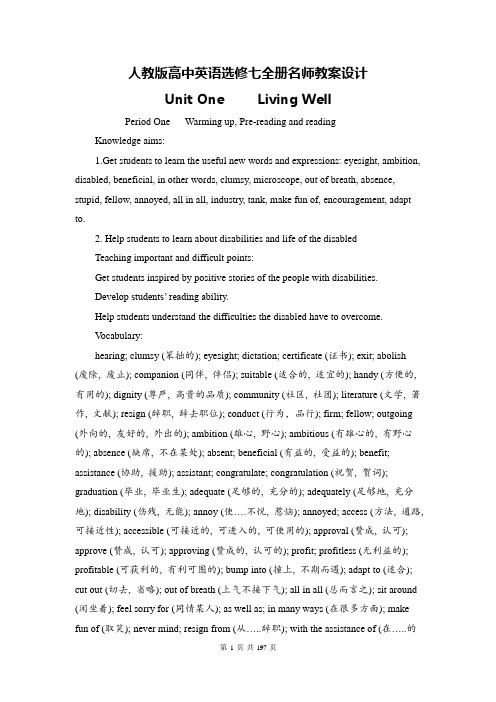
人教版高中英语选修七全册名师教案设计Unit One Living WellPeriod One Warming up, Pre-reading and readingKnowledge aims:1.Get students to learn the useful new words and expressions: eyesight, ambition, disabled, beneficial, in other words, clumsy, microscope, out of breath, absence, stupid, fellow, annoyed, all in all, industry, tank, make fun of, encouragement, adapt to.2. Help students to learn about disabilities and life of the disabledTeaching important and difficult points:Get students inspired by positive stories of the people with disabilities.Develop students’ reading ability.Help students understand the difficulties the disabled have to overcome.V ocabulary:hearing; clumsy (笨拙的); eyesight; dictation; certificate (证书); exit; abolish (废除, 废止); companion (同伴, 伴侣); suitable (适合的, 适宜的); handy (方便的, 有用的); dignity (尊严, 高贵的品质); community (社区, 社团); literature (文学, 著作, 文献); resign (辞职, 辞去职位); conduct (行为,品行); firm; fellow; outgoing (外向的, 友好的, 外出的); ambition (雄心, 野心); ambitious (有雄心的, 有野心的); absence (缺席, 不在某处); absent; beneficial (有益的, 受益的); benefit; assistance (协助, 援助); assistant; congratulate; congratulation (祝贺, 贺词); graduation (毕业, 毕业生); adequate (足够的, 充分的); adequately (足够地, 充分地); disability (伤残, 无能); annoy (使….不悦, 惹恼); annoyed; access (方法, 通路, 可接近性); accessible (可接近的, 可进入的, 可使用的); approval (赞成, 认可); approve (赞成, 认可); approving (赞成的, 认可的); profit; profitless (无利益的); profitable (可获利的, 有利可图的); bump into (撞上, 不期而遇); adapt to (适合); cut out (切去, 省略); out of breath (上气不接下气); all in all (总而言之); sit around (闲坐着); feel sorry for (同情某人); as well as; in many ways (在很多方面); make fun of (取笑); never mind; resign from (从…..辞职); with the assistance of (在…..的协助下); all the best (祝贺一路顺利); have access to (有权进入, 接近, 使用); meet with; one in million (凤毛麟角, 稀罕的人和事); in other wordsGrammar: The use of infinitive.Step 1 Warming up1. Warming up by discussing:Ask students to talk about people with a mental or physical disability to see how much they know about disabilities. Then show them some photos of people with disabilities by discussing the following questions.1) Do you know any famous people who are disabled?2) What difficulties do they have to overcome in their daily life?3) What have they achieved?(Suggested answers:Steven Hawking has a muscle disease, but he made great contribution in science and puts forward his theory about black holes.Beethoven was deaf in one ear when he was 26 and totally deaf at the age of 35, but he was a great composer.Helen Keller was deaf and blind, but she was a great writer.)2. Warming up by talkingFirst ask students to look at some pictures and read what these people have achieved even though they each have disability. Next work with partners to talk about what disability they might have according to each description below the picture1) Rosalyn is in a wheelchair, she has walking difficulty.2) Richard has difficulty with eyesight, so he can’t read the questions or write the answers for his college entrance exams.3) Sally has hearing problems (though not deaf as she can still understand loud speech in the cinema.)4) Gao Qiang was born with Down’s Syndrome, which is a mental disability. Some Down’s Syndrome Down’s Sufferers have made a good career as actors.Step 2 Pre-readingAsk students to read the short paragraph in Pre-reading carefully and find out the purpose of the website “Family Village”.1) To give ordinary young people with a disability a chance to share their stories with others.2) To inspire other disabled people.3) To get non-disabled people to understand more about how challenging life can be for people with disabled.Step 3 Reading1. Skimming: Ask students to read the passage fast just to sum up the main idea of each paragraph:Paragraph 1: An introduction to Marty and his muscle disease.Paragraph 2: How the disease developed / started.Paragraph 3: Marty met a lot of difficulties at school.Paragraph 4: How his life has become easier.Paragraph 5: The advantages of his disease.2. Scanning: Ask students to read the passage carefully to locate detailed information.1) First ask students to read paragraph one and complete the chart below.2) Neat read paragraph two and three to answer the following questions.Why did the doctors cut out a piece of muscle from Marty’s leg?_______________________________________________________.3) Read the paragraph four and answer the following questions.What is Marty’s ambition?_______________________________________________________.What is Marty’s achievement?_______________________________________________________.What is Marty’s hobby?____________________________________________________.4) Ask students to find Marty’s advice in paragraph five:______________________________________________________._______________________________________________________._______________________________________________________.3. 根据课文内容填空Step 4 Consolidation1.Ask students to read the whole passage to choose the best answers1) True or falseA. Although there are a few students who look down upon him, Marty never getsannoyed.B. Marty leads a meaningful life and does not feel sorry for being disabled.C. Marty only spends time with his pets and never with his friends.D. Marty’s disability has made him more in dependent.2) From the passage we can infer __________.A. Marty asks others to feel sorry for him.B. Marty never loses heart.C. Marty is afraid of being made fun of.D. Marty will not accept any encouragement because he has grown stronger psychologically.2 Ask students to work together to write a mini biography for Marty according to the textStep 5 Discussion1 Ask students to discuss the following questions in small groups1) How did Marty’s feeling changed over time?_______________________________________________________.1)What kind of person do you think Marty is? Can you use adjective words todescribe him?__________________________________________________.Step 6 AppreciationAsk students to read two poems for appreciation when facing obstacles in the future.Step 7 Homework1 Retell Marty’s story according to the mini biography2 Surf the internet to learn about the life of disabled people.Period 2 Language StudyTeaching aims:1. To learn the useful expressions and sentence structures in the reading.2. To enable the students to use language points both orally and in written forms.3. To further get students inspired by Marty Fielding.Step 1 Learning words and phrases1. ambition: 雄心, 志向, 抱负, 目标. ambition to be / do sth. 或ambition fo sth; achieve / rea lize / fulfil one’s ambition 达到目标/ 实现夙愿Great knowledge, experience and wisdom will help a man in a top position to achieve his ambition.广博的知识丰富的经验和无穷的智慧对于高位的人实现自己的抱负将大有裨益.The harder part of the mission has passed, and the rest is just a piece of cake.这项任务中最困难的一部分已经通过了, 剩下的就只是小菜一碟.The news that she has achieved / realized / fulfilled her ambition to be a musician (实现了她当音乐家的梦想) is widely spread by the people in the small town.2. be suitable for / to sb: 适当的, 适合的.The work was not suitable to me.I d on’t think I should be suitable for the post.He tried to find a suitable word to describe the picture.比较: fit: 指大小尺寸合适suit: 指款式和样式合适match: 指大小, 色调,形状, 性质等方面的搭配. fit 常同for连用, 而suit常同to连用.These shoes doesn’t fit me----have you got a large size?It does n’t suit you to have your hair cut short?He suited his speech to his audience.The People’s Great Hall and the Historical Museum match the Tian An Men Beautifully.人民大会堂和历史博物馆把天安门陪衬得极为美丽.Experts in education call for more books suitable for children (适合儿童阅读的). (suitable)3. benefit: 有益于, 受益, 好处. Be beneficial to / be of benefit to 对….有益for the benefit of sb = for sb’s benefit 为了…的利益, 为了帮助….. benefit from 从…..中受益Using computers has a beneficial effect on children’s learning. / Using computers is benefic ial to children’s learning. 使用电脑对孩子的学习很有好处.The warning sign was put there for the benefit of the public / for the public’s benefit.那儿设立的警告牌已引起人们的警惕.Both sides have benefited from the talks.I hope what I have written will benefit / be benefit to (我写的这些将有助于) someone else who may feel the same way.4. in other words: 换句话说big words大话; beyond words无法用言语表达; get in a word插话; eat one’s words承认说错了话; leave word留言; in a / one word总而言之; in words用语言; have words with与某人争吵; word for word逐字的; go back on one’s word食言; without a word什么也没说; keep / break one’s word守信/ 失信; have a word with与某人谈话; have a good word to say for sb / sth说某人或某物的好话.You can stay at home and needn’t come here any longer.He took the dictionary without my permission. In other words, he stole it.The little girl was alone in the dark house, frightened beyond words (感到无法言传的恐惧). (frighten; word)5. in addition: 此外, 另外, 还有.6. knock into (= run into): 撞上或碰上, 巧遇某人.In addition, my mother’s best friends will join in our family party.You clumsy guy! You’ve knocked over my coffee!When Lily took her first job, she was a clumsy girl, but now she is a successful career woman.初涉职场时, Lily算不上是一个机灵的女孩, 可现在却是一位成功的职业女性.The bus bumped into the back of the car.In addition t an album, I gave him a pen and a pencil.7. add….to…..把…..加到…..; add up总计, 加起来; add to增加; add up to总共达到, 意味着;Please add up all these figures and see how much we can get.His words don’t add up: he must be lying. 他的话前后不一致, 他一定在撒谎.These figures in the bill add up to one billion.He added that they would return a week later.The bad weather added to our difficulties in (增加了我们的困难) making a successful climb of Himalayas.8. cut out切掉, 删掉; cut up切碎; cut down砍掉, 削减, 压缩; cut in超车抢道, 打断, 打搅某人; cut off切断;I cut this article out of the newspaper.I would cut out the bit about working as a waitress. 我想删掉有关做女服务员的那段经历.The flood cut off their supplies.She kept cutting in our conversation.9. Judging from从…..看来; Generally speaking一般来说; Considering考虑到; Broadly speaking大体上说;Judging from appearance, he seems to be a strong man.Generally speaking, this novel is not very inspiring (吸引人的).10. including: 包括…在内;There are four members in my family, including me / me included.He made much contribution to the company’s success, including abolishing (包括废除) the unreasonable management system. (include; abolish)11. out of breath: 上气不接下气.His heart condition makes him out of breath.After (having) supper, he went into his room to do his homework.相关短语: out of date过期; out of reach够不着; out of work失业; out of sight 看不见; out of order坏了; lose one’s breath喘不过气来; take a deep breath深深地吸了一口气; out of the question不可能的, 办不到的; out of question无疑, 没有问题, 毫无疑问; out of control失控; hold one’s breath屏住呼吸; out of fashion过时, 不流行; catch one’s breath松一口气; out of patience不能忍受.After he had worked in the factory for ten years, he went abroad.I haven’t heard any noise since I slept.How long is it since you lived in Shanghai?The granny is so old as to be out of breath (以至于上气不接下气) going only a short distance. (as; breath)12. absence缺席, 不在, 没有. Absence of mind心不在焉; leave of absence假期, 休假; absence without leave擅离职守, 开小差; in / during one’s absence = during / in the absence of当某人不在时, 在缺乏某物的情况下;absent-minded心不在焉的, 健忘的; be absent from不在, 缺席; absent oneself from缺席, 不在;Please look after my house during my absence.Plants cannot exist in the absence of oxygen, nor can animals.He failed in the exam because of his absence of mind.He spoke to his wife absent-minded.He was absent from the meeting.He is absent from Beijing. 他不在北京(而在其他的地方).He is absent in Beijing. 她不在这里而在北京.He was forced to accept it as true in the absence of other evidence (由于没有其他的证据), leading to the unwise decision. (absence).13. annoy: 使生气, 招惹, 妨碍. annoyed: 感到恼怒的, 烦恼的annoying:令人恼火的.相关短语: annoy sb with sth / by doing sth因….使某人生气; be annoyed at / about / by sth因为某事而感到困扰; get / be annoyed with sb生某人的气; be annoyed + that-clause生….的气;I met an annoying problem.Don’t annoy your neighbours by singing loudly at night.He was annoyed at his lost ID card.He was annoyed that the book was missing.I was annoyed with Mary for forgetting to (因为Mary忘记了…..而很生她的气) bring me the wonderful novel as she had promised. (annoyed; forget)14. all in all总而言之; in all总共; at all根本; after all毕竟, 别忘了; above all 最重要, 首先; first of all首先;There are many beautiful sentences in your article and its handwriting is good too. All in all, I’m quite satisfied with it.In all there are 40 students in our class.The parents didn’t worry about their daughter at all, for they believed she could succeed in getting the first prize.Don’t blame him too much. After all, he is a small child.When traveling abroad, above all, you need to prepare your passport.I am glad to join you in this game, but first of all please allow me to introduce myself to you.15. be said / report ed / happy / considered / known to have done…..Mr. Brown is a kind woman; she isn’t supposed to have mistreated (按说不应该虐待) animals that way. (suppose, mistreat)16. with / without + 名词/ 代词/ 不定式/ 形容词/ 副词/ 介词短语/ 现在分词/ 过去分词.With the weather so close and stuffy (闷), ten to one it will rain presently.Possibly this person died without anyone knowing where the coins were hidden.I sat in my room for a few minutes with my eyes fixed on the ceiling.With nowhere to go (因为无处可去), he had to spend all his winter holiday accompanying with his old granny. (with)17. it作形式宾语的几种特殊情况:1) 动词+ it + that从句, 常见的的动词有: have, take, put, like等.I like it that you came.I take it that he will come on time.You can put it that it was arranged before.你可以说这是以前安排的.Rumor has it that the defence minister will soon resign.据传闻, 国防部长不久就要辞职.2) 动词+ it + when / if 从句, 常见的动词有: enjoy, hate, love, like, dislike, appreciate, prefer等.I dislike it when you whistle.We really appreciate it when she offered to help.I’d prefer it if I didn’t have to do so much work.3) 动词+ 介词+ it + that从句, 常见的动词短语有: see to, look to, stick to, depend on, answer for等.See to it that you’re not late again. 注意千万不要再迟到.Look to it that this doesn’t happen again.注意不要再发生类似的事情.I can’t answer for it that he will come. 我不能保证他会来.You may rely on it that he will come to meet you.你放心, 他会来接你的.4) 动词+ 介词短语+ that从句. 常见的短语有: take it for granted, bring it to sb’s attention, owe it to sb. 等.We owe it to you that there wasn’t a serious accident. 多亏了你才没有发生严重的事故.I took it for granted that he would help you.我认为他会帮助你们的.18. worthwhile, worthy, worth的区别:worth只能作表语, “值得的, 有价值的”, 后接名词, 代词或动名词的主动形式.Worthy可作表语或定语, 作定语时表示“值得的, 有价值的, 值得尊敬的”,作表语时表示“某物或某事值得做”或“适合做某事”, 其后接of + 名词/ 代词,不定式或动名词的被动式being done.Worthwhile可作表语或定语, 表示“值得的, 值得做的, 有意义的”,用作表语时可接动名词或动词不定式. 常用的句式是: It is worthwhile doing / to do sth. 主语+ 动词+ it + worthwhile + doing / to do sth.This picture is worth 500 dollars.This problem is worth consideration / considering. = This problem is worthy of consideration / of being considered / to be considered.这个问题值得考虑.That is a worthwhile book.The Summer Palace is worthwhile going / to go to have a visit.Sensible people don’t think it worthwhile to buy / buying (值得买) things which are not needed even at a low price. (worthwhile)19. mean 作及物动词时, 表示“意思是, 打算, 意味”;作形容词时表示“低劣的, 刻薄的, 吝啬的”常用于mean to do sth. 或mean doing sth.These symbols mean nothing to me.这些符号我完全不明白是什么意思.I meant this photo for my mother.我准备把这些照片送给我的妈妈.I mean to go, but my father would not allow me to.His words meant a lot to me.Waving the hand means saying goodbye.She is too mean to make a donation. 她很小气, 不肯捐赠.注意mean to do sth. / mean to have done sth / had meant to do sth.都表示“原本打算做…..而实际上并没有做”.20. conduct: 作名词时表示“行为, 品行, 指导”;作动词时表示“指挥, 引导, 管理” 而conductor意思是“乐队指挥, 售票员, 导体”. 相关的短语是: a bad conduct恶劣行为, under the conduct of 在….指导下/ 管理下; conduct oneself well / badly 表现得很好/ 糟糕His conduct of the business was very successful.他的事业进展得相当顺利.The curator conducted the visitors round the museum.馆长领着游客在博物馆中参观.Copper conducts electricity better than other materials do.铜的导电性比其他材料好.The boy’s rough behavior infuriated her.这个男孩粗鲁的行为激怒了她.behavior无复数形式, 可指一切好的或坏的行为; conduct主要指用道德标准衡量的正当或不正当品行, 尤指遵守或违反某些已定的法规的含义.His conduct at school was disgraceful. 他在学校的行为不端.He got a three-year sentence, but may come out early if he conducted himself well (表现好) in prison. (conduct)21. prevent ….from doing sth.阻止或防止某人干…..;His advice prevented / stopped me (from) making a serious mistake.= His advice kept me from making a serious mistake.他的忠告是我免于犯下严重的错误.22. live a / an ……life过…….的生活There are several ways to live a colorful life on campus.要在大学校园里过上充实的生活有很多方式.23. There was a time when ……有一段…..的时期, 曾经……In her letter he mentioned the time when people fought with enemies.There was a time when girls couldn’t go to school.It is high time that we planted (should plant) trees there.It was the third time (that) he had done that kind of thing.The girl had a hard time adapting herself to living in a foreign country.24. adapt oneself to do sth适应某物be well adapt to 非常适应adapt ….to….使…..适应…. be adapted from…..由….改编adapts sth. for sth 改编, 改造, 使之适应新情况或新用途adapt指作较大的改变以适应新的环境或情况, 也表示“改编, 改写”; adjust 侧重于作较小的改动或移动, 或指在整体中调整呢个各部分之间的关系, 使之一致; accommodate场之一拖鞋或前就做出对人或对既有利的调整; gear侧重于“使适应”, 对某事物加以调整以适应某种需要, 达到某种水平或标准.We should try every effort to prevent violence from happening (阻止暴行发生) at school, or students’ personal safety could not be guaranteed. (prevent; violence) The children found it hard to adapt themselves to their new school.He could not adapt his way of life to the company.These flowers are well adapted to the conditions of rooms. 这些话非常适应室内的环境.The materials can be adapted for use with older children. 这些布料可以修改一下用在大一点的孩子身上.The movie was adapted from a novel.It’s hard to adapt the story for the film.We should adapt our thinking to the new conditions. 我们应该使自己的思想适应新的环境.The body adjusts itself to changes of temperature.Ha had to accommodate his steps to hers.Industry must be geared to wartime needs. 工业必须调整以适应战时的需要.25. as well as: 也, 又, 和…..一样, 相当于too, also.Helen as well as I is eager to take part in the evening party.He directed as well as acted in the film.She can sing as well as her sister.His story is as good as a play.I am going to study abroad and my brother is going as well.The young man who had lost both arms in an accident could handle a pen as wellas play the piano (还能弹钢琴) with his feet. (as)26. resign from office辞职resign oneself to one’s fate 听天由命resign….to…..把….托付给….. resign one’s position as + 职务名称表示“辞去某职务” resign oneself to doing sth 听任某种影响, 只好做某事In order to look after her sick mother, Mary decided to resign her position as manager in her company.I resign my children to your care. 我只好把孩子委托你来照顾.I resigned myself to a long wait in line. 我只好在长队中等候.In no situation, shall we resign ourselves to or fate. 在任何情况下, 我们都不能听天由命.Failure as he has been in his previous attempts, he refuses to resign himself to defeat / to being defeated (不甘失败). (resign, defeat)27. adequate: 适当的, 足够的, 差强人意的.adequate: 着重于符合一个客观要求或标准, 可指数量上足够, 质量上适当. enough: 是常用词, 可用作后置定语, 指足以满足某种目的或愿望, 在数量上可以和adequate和sufficient互换, 但enough不表示质量.ample: 指事件或商品等“充足而有多余”abundant: 指就某个方面来说“丰富的, 丰裕的”sufficient: 指为特定的目的和需要提供足够的数量.Children need adequate nutrition to build up their body.孩子需要足够的营养长身体.The skater’s technique was only adequate.滑冰者的技术只能说差强人意.Every student has free access to the library. = The library is accessible to every student.每位学生都可以自由利用图书馆.The pay was adequate for me. 所得报酬够我用的.For the use of beginners, the book is adequate.对初学者来说, 这本书够用了.They have enough / adequate computers for students to practice on.他们有足够的计算机让学生上机训练.There was enough / adequate food for a month. 有够一个月的食物.We have got men enough. 我们有足够的人手.This leaves her ample time to prepare three meals a day.这使她有足够充足的时间一天做三顿饭.They had an abundant fruit harvest last year. 他们去年水果大丰收.They have got sufficient food and water for an 8-day journey.他们已准备好足够8天旅行的食物和水.The easiest access to (最容易的办法) the problem is still under discussion. (access)28. suggest: 建议(接虚拟语气);表面, 暗示(不用虚拟语气)My parents called me suggesting that I should go home for the weekend.His smile suggested that he had succeeded in this exam.表示请求, 要求, 命令或建议等意义的动词有: advise, ask, demand, desire, decide, insist(坚决要求), order, command, propose, request, suggest(建议)等所接的宾语从句里, 以及advice, demand, decision, order, proposal, request, requirement, suggestion等所接的同位语从句, 主语从句以及表语从句里, 谓语动词用虚拟语气should + 动词原形.She insisted that a seat (should) be looked in advance.He advised that a doctor (should) be sent for.We followed his advice that we should ask our teacher for help.He issued the order that the troops (should) withdraw at once.We followed his advice that the disabled (should) not be made fun of (不该取笑) under any circumstance. (make)29. meet with遇到, 经历, 其后可接抽象名词: obstacles (障碍), difficulties(困难), misfortune(不幸), hostility(敌视), criticism(批评), kindness(善意, 善待), denial(否认).A Chinese special representative would meet with U.S envoys about the Darfurissue.一名中方特别代表将就达尔富尔问题与美国特使进行会晤.His speech met with a cold acceptance, which was far beyond his expectation.他的演讲受到冷遇, 这大大出乎他的意料.30. approval: 赞成, 认可, 其后接介词of相关短语: a nod of approval首肯; for sb’s approval求某人指正; give one’s approval to批准; with / without approval of经/ 未经…..批准; approve of sb / sth赞成, 认可, 同意; on approval(指货物)供试用的不满意可以退的; meet with / have sb’s approval得到某人的赞同; present / submit sth to sb for approval把某是提交某人批准.We have obtained his approval of our using his car.我们已得到他的允许可以使用他的汽车.She smiled her approval. 他微笑着表示赞成.The professor does not approve the government’s foreign policy.那位教授不赞成政府的外交政策.The city council has now approved the scheme for the erection of a new public library.市议会业已核准建造一座新的公共图书馆的计划.I’m afraid your parents won’t approve of your going there.31. 与meet相关的搭配: make two ends meet亮认为出, 使收支相抵; meet sb. half-way与某人妥协; meet up with sb.偶遇某人; meet one’s Waterloo遭遇失败, 遇到毁灭性的打击; meet one’s approval得到某人的认可; meet the case恰当, 符合要求, 解决问题; meet the demand满足需要, 符合要求; meet sb. in the mouth与某人迎面相遇, 当面抵抗; meet sb.’s view和某人意见一致;32. approval: 表示某人某事是正确的或令人满意的, 因而赞同获认可. 是正式用词, 一般是上级或权力机关对下级应用, 表示“同意, 批准, 通过”.consent: 通常指上级对下级的请求, 建议或行动, 意为“同意, 批准, 赞同”,常与介词to 搭配, 也可接不定式.agree: 常指原先有分歧, 经过协商讨论和思考后同意他人的想法, 意见等.I cannot approve of her marrying so yang.The National People’s Congress approve d the report.全国人民代表大会批准了这个报告.The teachers have agreed to the teaching plan.His father will never consent to the marriage.他父亲绝不会同意这桩婚姻.The principle consented to consider the request.校长同意考虑这个请求.We all like others to show approval of what we do (赞同我们), which is said to be human nature. (approval, what)Step 2 Using words and phrases1. Do Exercise 1, 2 and 3 on Page 4 in Learning about Language.2. Translate the following sentences in to Chinese.1) As her eyesight failed she knew she would have to resign from the community health committee.2) She is famous in literature for her novel about the campaign to abolish slavery.3) Never mind about that software! We will repair it when we meet with the engineer from the company.4) Congratulations! The profit from selling those wheelchairs will be enough to buy six new benches for your school.5) The parrot flew out of the pet shop and landed on the bowling-green across the road.6) I left the meeting when they began to talk about politics and headed for the exit.7) It is my ambition to make sure that the disabled people in our neighborhood have access to all public buildings.8) I had wanted to clean out the basement in his absence, but unfortunately Ididn’t have time.9) James carried his new fish tank carefully to the house, dreaming of how wonderful it would look full of colorful fish.10) The bench was hard to sit on, but it provided an excellent resting place for people after climbing the hill.Step 3 ConsolidationAsk students to retell the text after learning the useful words and phrases.补充练习:1. The young man of great personality and _____ has made up his mind to be a successful diplomat.A. ambitionB. hopeC. desireD. aim2. As Mr. Best was passing the bookstore, he though t he’d just _____ to see whether any interesting books were on sale.A. look throughB. look inC. look upD. look for3 What’s a(n) _____ present for a couple celebrating their twenty-fifth wedding anniversary?A. appropriateB. suitableC. properD. fit4. Some species of animals have become extinct because they could not ______ to a changing environment.A. adoptB. adaptC. usedD. accustom5. The disabled boy whose ______ is “never say die” turned out to b e the CEO of two companies, which even inspired many healthy men.A. sloganB. mottoC. catchword (口号)D. saying6. His grades are starting to ______ because he spends too much time on playing computer games.A. sufferB. standC. surviveD. withstand7. The two sides failed to ______ at an agreement about the cooperative programme after several hours’ discussion.A. arriveB. attainC. reachD. achieve8 The environmentalists said wild goats’ ______ from the vast grassla nds was a indication of the worse environment.A. escapeB. absenceC. attendanceD. appearance9. Too much pressure leads to unhealthy _____ such as poor eating habits, which increase the risk of heart disease.A. conductB. behaviorC. actionD. conduction10. Nobody _____ a funeral, such a somber (阴暗的) occasion, is supposed to laugh or joke, or he or she would be considered rude.A. joiningB. taking part inC. attendingD. participating11. The tragedy of the innocent young Brazilian boy killed by the British police has put the British police in a difficult _____.A. occasionB. caseC. situationD. background12. It ______ him when Tom made fun of his ugly handwriting, so he fought with the boy.A. annoyedB. disturbedC. embarrassedD. trouble13. He ran as fast as he could and finally caught up with his teacher but got______.A. out of sightB. out of controlC. out of breathD. out of order14. Fallen rocks _______ the only access to the valley, where thousands of victims of the landslide were waiting for rescue.A. cut outB. cut inC. cut offD. cut down15. There are many bad customs and laws that ought to be ______, or equality will be nowhere to be found.A. stoppedB. abolishedC. cancelledD. repeated16. The chairman of the board of directors was forced to ______ in protest against the decision.A. resignB. assignC. designD. signature17. Shen Congwen, a master of ______, describes the beauty of his hometown in “the border town”.A. writingsB. publicationsC. literatureD. works18. According to the survey, ______ there are nearly one million people in this small city out of work during the economic crisis.A. all in allB. in allC. at allD. after all19. He found his first job. ______, he needn’t depend on his father any more.A. In other wordsB. In a wordC. In so many wordsD. In word20. In spite of all the difficulties, we _____ our task ahead of schedule, tired but very happy.A. satisfyB. meetC. fulfilD. answer21. All the public transport will be _____ to both ordinary people and the disabled.A. affordableB. accessibleC. reasonableD. avoidable22. The three sisters de cided to hold a family party to ______ their parents’ silver wedding.A. welcomeB. congratulateC. memorizeD. celebrate23. My father used to find himself ______ with feeling of regret whenever he broke his promise of giving up smoking.A. overcomeB. defeatedC. beatenD. conquered24. With her children living far away, the lonely old lady tended to regard her pet dog as her _____.A. companionB. fellowC. colleagueD. partner25. According to the public, _____ to the Third World is at present little more than a drop in the ocean.A. assistanceB. aidC. helpD. service26. The independent boy earned his living even before his _____ from university, which differs him from his peers.A. graduationB. ceremonyC. qualificationD. completion27. Joan is as proud as a peacock after winning her first swimming _____, not。
人教版高中英语选修7优秀教案设计方案一Unit2RobotsPeriod 4新
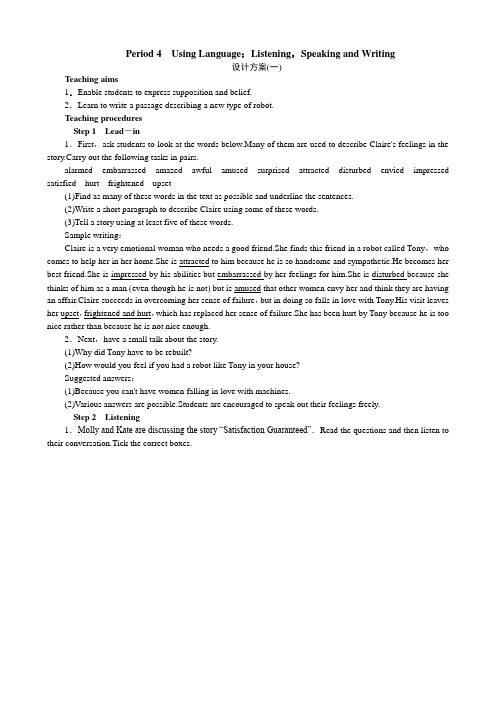
Period 4Using Language:Listening,Speaking and Writing设计方案(一)Teaching aims1.Enable students to express supposition and belief.2.Learn to write a passage describing a new type of robot.Teaching proceduresStep 1Lead-in1.First,ask students to look at the words below.Many of them are used to describe Claire's feelings in the story.Carry out the following tasks in pairs.alarmed embarrassed amazed awful amused surprised attracted disturbed envied impressed satisfied hurt frightened upset(1)Find as many of these words in the text as possible and underline the sentences.(2)Write a short paragraph to describe Claire using some of these words.(3)Tell a story using at least five of these words.Sample writing:Claire is a very emotional woman who needs a good friend.She finds this friend in a robot called Tony,who comes to help her in her home.She is attracted to him because he is so handsome and sympathetic.He becomes her best friend.She is impressed by his abilities but embarrassed by her feelings for him.She is disturbed because she thinks of him as a man (even though he is not) but is amused that other women envy her and think they are having an affair.Claire succeeds in overcoming her sense of failure,but in doing so falls in love with Tony.His visit leaves her upset,frightened and hurt,which has replaced her sense of failure.She has been hurt by Tony because he is too nice rather than because he is not nice enough.2.Next,have a small talk about the story.(1)Why did Tony have to be rebuilt?(2)How would you feel if you had a robot like Tony in your house?Suggested answers:(1)Because you can't have women falling in love with machines.(2)Various answers are possible.Students are encouraged to speak out their feelings freely.Step 2Listening1.Molly and Kate are discussing the story “Satisfaction Guaranteed”.Read the questions and then listen to their conversation.Tick the correct boxes.(1)What does Kate think the difference between robots and human is?(2)How does Kate think Claire was hurting herself?(3)Why would one of the girls like a robot such as Tony living at her house?(4)What does Kate think the company's biggest mistake was?Suggested answers:(1)Robots can't feel emotion of any kind.(2)By seeing herself in a negative way.(3)She likes the idea of a handsome man whose only purpose was to please her.(4)Making the robot look so much like a real man.3.Listen to the tape again and write down the expressions of supposition and belief. Keys:Step 3DiscussionStudents are asked to work in groups and imagine having a robot in their houses to do the housework.Discuss what the positive or negative effects of the situation would be.(Don't forget to use expressions of supposition and belief.Students are given five minutes.Five minutes later,ask some students to present their ideas to the whole class.Encourage every student to use his imagination,because there're no right or wrong answers,only different opinions.After students present their opinions,the teacher speaks out his or her opinion.)A samplePositive_effectsI think it is wonderful for people to have robots in their houses to do the housework.After a day's work,when people get home,they can be really relaxed with everything prepared by their robots.A robot never gets tired.Nor does it complain.Life will be very easy and comfortable.Negative_effectsMaybe people can enjoy a very comfortable life with the help of their robots.But at the same time I believe people will lose the ability to do housework.As time goes by,people cannot live well without a robot's help.I think that kind of life would be terrible.Step 4WritingStudents are asked to work in groups.First decide the purpose of the robot,then make a list of the abilities the robot has.Next draw a picture on a piece of paper and name its parts and explain what each part does.Finally writeTips on designing your robotsFor each robot that you build,you will have to choose options for six major robotcharacteristics.Each characteristic gives rise to one or more questions.These are:Looks:What does the robot look like?Is there a reason for it to look as it does?Sensing:How does the robot “know” or figure out what's in its environment?If it were put in a different environment,would it be able to figure out this new environment?Movement:How does the robot move within its environment?If it were put in a differentenvironment,would it still be able to move within this new space?Manipulation:How does the robot move or manipulate other objects within its environment?Can a single robot move or manipulate more than one kind of object?Energy:How is the robot powered?Can it have more than one energy source?Intelligence:How does the robot “think”?What does it mean to say that a robot “thinks”?Note:Not all robots have to have all six characteristics.For example,some robots don't need to manipulate things,so they have no manipulating characteristics.Some robots have more than one manifestation of a characteristic.For example,a robot may be able to sense its environment using both a vision system and sonar.Students are asked to discuss first.If there is not enough time,they should finfish it after class.Step 5HomeworkWrite a passage describing a new type of robot.Sample writing:Remote Presence RobotsRemote Presence Robots allow a medical expert to visually examine and communicate with a patient from anywhere in the world,via the machine,using wireless technology.The robot runs on a wireless system with the doctor at another location.It is controlled via a secure broadband Internet connection.The doctor (controller) and patient are able to have a real-time two-way audiovisual interaction,with the controller in full command of the robots movements,head monitor and camera.The doctor “driving” the robot can view the patient,ask questions and read patient records,view X-rays and test results from the console.The patient sees the doctor's image on the robots “face”.Although the robot does not physically examine the patient,it allows face-to-face contact between the doctor and patient,providing immediate access to specialists.Our robots certainly would never replace all doctors on ward rounds,but they are a communication tool which allows doctors to have direct contact with their patients if they are unable to get to them.And this may be a significant step for patient care.The rubbish collector robotThe rubbish collector is a robot about half the size of a small car.Its body is square and contains a large rubbish bin inside it.It has a camera attached to the top front of its body.Also at the front is a pair of arms.Undern eath it has four wheels and six legs.With the camera it can “see” rubbish such as paper,glass,and plastic.If the surface of the ground is smooth,it runs on its wheels,and if the ground is rough,it unfolds its legs and walks.When it sees a piece of rubbish,it stops and uses its arms to pick it up and put it in its rubbish bin.However,when it sees a person,an animal or a plant,it goes around it as it is able to recognize when something is not a piece of rubbish.The company should make this robot as it would be very popular with schools.It would clean the outside grounds of the school and so give the students more time to spend on their studies.It would also be a great advantage to have at sports grounds or any other area where rubbish is dropped by the public.。
人教版高中英语选修七全册教案
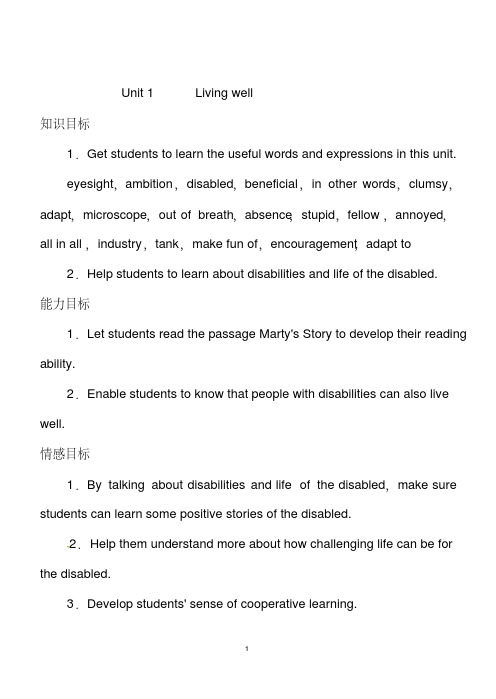
Unit 1 Living well知识目标1.Get students to learn the useful words and expressions in this unit.eyesight,ambition,disabled,beneficial,in other words,clumsy,adapt,microscope,out of breath,absence,stupid,fellow,annoyed,all in all,industry,tank,make fun of,encouragement,adapt to 2.Help students to learn about disabilities and life of the disabled.能力目标1.Let students read the passage Marty's Story to develop their reading ability.2.Enable students to know that people with disabilities can also live well.情感目标1.By talking about disabilities and life of the disabled,make sure students can learn some positive stories of the disabled.2.Help them understand more about how challenging life can be for the disabled.3.Develop students' sense of cooperative learning.教学重点Get students inspired by positive stories of the people with disabilities. 教学难点1.Develop students' reading ability.2.Help students understand the difficulties the disabled have to overcome.学情分析1.教学方法1.Task-based teaching and learning.2.Cooperative learning.教学过程Step 1Warming up1.Warming up by discussingFirst ask students to talk about people with a mental or physical disability to see how much they know about disabilities. Then show some photos of people with disabilities. Students will be asked to discuss the following questions in small groups.Do you know any famous people who are disabled?What difficulties do they have to overcome in daily life?What have they achieved?2.Warming up by talkingFirst,ask students to look at the pictures and read what these people have achieved even though they each have a disability. Next,work with partners to talk about what disability they might have according to each description below the picture.Step 2Pre-readingAsk students to read the short paragraph in Pre-reading carefully and.find out the purpose of the website “Family Village”Step 3Reading1.SkimmingGive students 2 minutes;ask them to read the passage fast to fill in the blanks:Sum up the main idea of each paragraph:Paragraph 1:A(n)______ to Marty and his muscle disease.Paragraph 2:How the disease ______.Paragraph 3:Marty met a lot of ______ at school.Paragraph 4:How his life has become ______.Paragraph 5:The ______ of his disease.Suggested answers:Paragraph 1:An introduction to Marty and his muscle disease.Paragraph 2:How the disease developed/started.Paragraph 3:Marty met a lot of difficulties at school.Paragraph 4:How his life has become easier.Paragraph 5:The advantages of his disease.2.Scanning for detailed informationAsk students to read the passage carefully to locate the detailed information.(1)First ask students to read paragraph one and complete the chart below.DiseaseDifficultiesMottoSuggested answers:Disease A muscle disease that makes him very weak. Difficulti He can't run or climb stairs as quickly as other people.es Sometimes he is clumsy and drop things or bump intofurniture.Motto Live one day at a time.(2)Next read paragraphs two and three and choose the best answer.Why did the doctors cut out a piece of muscle from Marty's leg?A.Because they could cure the disease by cutting it out.标本).B.Because they wanted to use it as a specimen(C.Because they would transplant(移植) the new muscle.D.Because they wanted to find out the cause of the disease.Key:D(3)Read paragraph four and answer the following questions:①What is Marty's ambition?②What is Marty's achievement?③What is Marty's hobby?(4)Ask students to find Marty's advice in paragraph five.Step4:合作探究1.Ask students to work together to write a mini biography for Marty according to the text.My mini biographyNameStatusHealthInterests andHobbiesAmbitionMotto2.Discuss in pairs to get the main idea of the passage by filling in the blanks.Though he is a ______ person,Marty never feels ______ for himselfand he ______ his life.Step 5总结提升1.Ask students to read the whole passage and choose the best answers.(1)Which of the following is false?A.Although there are a few students who look down upon him,Marty never gets annoyed.B.Marty leads a meaningful life and does not feel sorry for being disabled.C.Marty only spends time with his pets and never with his friends.D.Marty's disability has made him more independent.(2)From the passage we can infer that ______.A.Marty asks others to feel sorry for himB.Marty never loses heartC.Marty is afraid of being made fun ofD.Marty will not accept any encouragement b ecause h e has grown stronger psychologically6Homework1.Retell Marty's Story according to the mini biography.2.Surf the Internet to learn more about the life of disabled people.教学反思:这篇文章是记叙文,对文章的整体理解不存在问题,不足之处是单词不熟。
完整word版高中英语选修7全册教案

Unit 1 Living well知识目标1.Get students to learn the useful words and expressions in this unit. eyesight,ambition,disabled,beneficial,in other words,clumsy,adapt,microscope,out of breath,absence,stupid,fellow,annoyed,all in all,industry,tank,make fun of,encouragement,adapt to2.Help students to learn about disabilities and life of the disabled.能力目标1.Let students read the passage Marty's Story to develop their reading ability.2.Enable students to know that people with disabilities can also live well.情感目标1.By talking about disabilities and life of the disabled,make sure students can learn some positive stories of the disabled.2.Help them understand more about how challenging life can be forthe disabled.3.Develop students' sense of cooperative learning.1教学重点Get students inspired by positive stories of the people with disabilities.教学难点1.Develop students' reading ability.2.Help students understand the difficulties the disabled have to overcome.学情分析1.教学方法1.Task-based teaching and learning.2.Cooperative learning.教学过程Step 1Warming up1.Warming up by discussingFirst ask students to talk about people with a mental or physical disability to see how much they know about disabilities. Then show some photos of people with disabilities. Students will be asked to discuss the following questions in small groups.Do you know any famous people who are disabled?2What difficulties do they have to overcome in daily life?What have they achieved?2.Warming up by talkingFirst,ask students to look at the pictures and read what these people have achieved even though they each have a disability. Next,work with partners to talk about what disability they might have according to each description below the picture.Step 2Pre-readingAsk students to read the short paragraph in Pre-reading carefully andfind out the purpose of the website “Family Village”.Step 3Reading1.SkimmingGive students 2 minutes;ask them to read the passage fast to fill in the blanks:Sum up the main idea of each paragraph:Paragraph 1:A(n)______ to Marty and his muscle disease. Paragraph 2:How the disease ______.Paragraph 3:Marty met a lot of ______ at school.Paragraph 4:How his life has become ______.3The ______ of his disease. :Paragraph 5 :Suggested answersAn introduction to Marty and his muscle disease. Paragraph 1:How the disease developed/started. Paragraph 2:Marty met a lot of difficulties at school. Paragraph 3:How his life has become easier. Paragraph 4:Theadvantages of his disease. Paragraph 5:Scanning for detailed information2.detailed the to locate to students read the passage carefully Askinformation.ask students to read paragraph one and (1)First complete the chart below.DiseaseDifficultiesMottoSuggested answers:A muscle disease that makes him very weak. DiseaseHe can't run or climb stairs as quickly as other people.Difficulti 4(2)Next read paragraphs two and three and choose the best answer.Why did the doctors cut out a piece of muscle from Marty's leg?Because they could cure the disease by cutting it out. A..Because they wanted to use it as a specimen(标本)B.) the new muscle. 移植.Because they would transplant(CBecause they wanted to find out the cause of the disease. .DDKey:(3)Read paragraph four and answer the following questions:What is Marty's ambition? ①What is Marty's achievement? ②What is Marty's hobby?③(4)Ask students to find Marty's advice in paragraph five.合作探究Step4:Marty biography for mini write together to 1.Ask students work to aaccording to the text.5My mini biographyNameStatusHealthInterests andHobbiesAmbitionMotto2.Discuss in pairs to get the main idea of the passage by filling in the blanks.Marty never feels ______ for himself ,Though he is a ______ personand he ______ his life.Step 5总结提升Ask students to read the whole passage and choose the best answers. 1.(1)Which of the following is false?Marty Although there are a few students who look down upon him,.Anever gets annoyed.being sorry not and meaningful leads .BMarty a life does feel for disabled.6Marty only spends time with his pets and never with his friends. .CMarty's disability has made him more independent. .D(2)From the passage we can infer that ______.Marty asks others to feel sorry for him A.Marty never loses heart B..Marty is afraid of being made fun of Cgrown has encouragement because he not D.Marty will accept anystronger psychologicallyStep 6Homework1.Retell Marty's Story according to the mini biography. 2.Surf the Internet to learn more about the life of disabled people.教学反思:这篇文章是记叙文,对文章的整体理解不存在问题,不足之处是单词不熟。
人教版高二英语选修七Unit4 Sharing教案设计
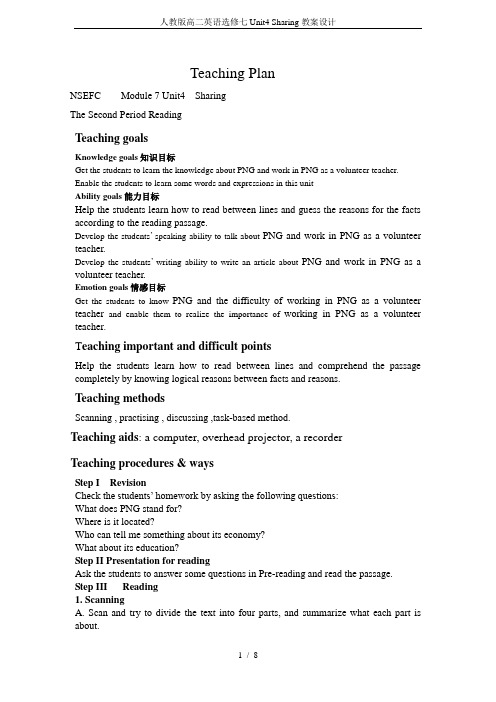
Teaching PlanNSEFC Module 7 Unit4 SharingThe Second Period ReadingTeaching goalsKnowledge goals知识目标Get the students to learn the knowledge about PNG and work in PNG as a volunteer teacher. Enable the students to learn some words and expressions in this unitAbility goals能力目标Help the students learn how to read between lines and guess the reasons for the facts according to the reading passage.Develop the students’ speaking ability to talk about PNG and work in PNG as a volunteer teacher.Develop the students’writing ability to write an article about PNG and work in PNG as a volunteer teacher.Emotion goals情感目标Get the students to know PNG and the difficulty of working in PNG as a volunteer teacher and enable them to realize the importance of working in PNG as a volunteer teacher.T eaching important and difficult pointsHelp the students learn how to read between lines and comprehend the passage completely by knowing logical reasons between facts and reasons.Teaching methodsScanning , practising , discussing ,task-based method.Teaching aids: a computer, overhead projector, a recorderTeaching procedures & waysStep I RevisionCheck the students’ homework by asking the following questions:What does PNG stand for?Where is it located?Who can tell me something about its economy?What about its education?Step II Presentation for readingAsk the students to answer some questions in Pre-reading and read the passage.Step III Reading1. ScanningA. Scan and try to divide the text into four parts, and summarize what each part is about.B. help the students to master the basic forms of a letter writing.2.Careful readingRead paragraphs 2-7 and then do the exercise.Step IV PracticeA.Find words in the passage that have the following meaning.B.Learn the following words or phrases by heart and complete the paragraph.stick out, come across, hear from, platform,(be) dying toStep V Post-readingDeveloping : I. guessingGuess the reasons for the facts according to the reading passage.Developing : II. discussionAsk the students to discuss the following question in group:Why do you think Jo became a volunteer in PNG?(Give as many possible reasons as you can.)Give the students a sample of the discussions :A: I think, first of all, Jo was a kind-hearted woman, who is willing to help others. Second, she knew enough about the poor conditions in PNG and thought that she could help teach in the schools. If I am given the chance, I will do whatever I can to help.B: In my opinion, Jo must have worked as a teacher in Australia, and she applied to become a volunteer abroad, and then she was sent to PNG as a volunteer.C: Maybe she thinks that education is the key to solving all the problems in PNG, so she, as a teacher, goes to PNG to help.Homework1. Finish Exercise 3 on Page 31.2. Read the passage again after class and find all the attributive clauses in it.3.Recite the key sentences in the text.教学流程图:Recite the following phrases and sentences after class:1.stick out 伸出e across 偶然发现或遇到;碰见3.hear from 接到……的信4.(be) dying to 极想;渴望5.in need 在困难中6.adapt (oneself) to 适应,适合7.for sure肯定如此,毫无疑问8.make a difference有关系;起(重要)作用9.dry up(河流,湖泊)干涸;(使)枯竭10.dry out(使)变干;(把)弄干11.adjust to 适应12.in the night在夜间1). I know you’re dying to hear all about my life here.2). I’ve included some photos which will help you picture the places I talk about.3). Tombe’s father, mukap, led us to his house, a low bamboo hut grasssticking out of the roof----this shows it’s a man’s house.4). When I reach the school grounds there are lots of “good mornings”for me from the boys, many of whom have walked a long way, sometimes up to two hours, to get to the school.5). In fact , I wonder if you could post this letter for me.。
人教版高二英语选修七教案模板

人教版高二英语选修七教案模板【教学目标】1.让学生掌握本节课的核心词汇和短语。
2.培养学生阅读理解、口语表达和写作能力。
3.提高学生对英语文化背景的理解。
【教学重点】1.核心词汇和短语的学习与应用。
2.阅读理解能力的培养。
3.口语表达和写作能力的提升。
【教学难点】1.长难句的解析与理解。
2.文章主旨的提炼与概括。
【教学过程】一、导入1.利用图片或视频,引导学生关注本节课主题。
2.询问学生对本节课主题的了解,激发学习兴趣。
二、核心词汇学习1.呈现本节课的核心词汇,让学生跟读、模仿发音。
2.解释词汇含义,给出例句,让学生理解词汇用法。
3.设计练习,让学生在语境中运用所学词汇。
三、阅读理解1.让学生快速阅读课文,了解文章大意。
2.提出问题,引导学生关注文章细节。
3.分析文章结构,帮助学生理解文章逻辑。
4.对长难句进行解析,让学生掌握阅读技巧。
四、口语表达1.根据文章内容,设计口语练习。
2.分组讨论,让学生在讨论中运用所学知识。
3.邀请部分学生展示口语成果,给予评价和指导。
五、写作训练1.给出写作话题,让学生进行思考。
2.提供写作框架和要点,帮助学生梳理思路。
3.让学生根据框架和要点,完成写作任务。
4.对学生写作进行评价,给予修改建议。
2.鼓励学生课后进行拓展学习,提高英语水平。
【教学实例】课题:Unit1Sports一、导入1.利用奥运会图片,引导学生关注运动话题。
2.询问学生对奥运会及运动项目的了解。
二、核心词汇学习1.呈现词汇:athlete(运动员)、stadium(体育馆)、medal(奖牌)等。
2.解释词汇含义,给出例句。
三、阅读理解1.让学生快速阅读课文,了解文章大意。
2.提出问题:Whatisthemnideaofthearticle?(文章主旨是什么?)3.分析文章结构,帮助学生理解文章逻辑。
四、口语表达1.设计口语练习:Ifyouwereanathlete,whatsportwouldyouchoose?(如果你是一名运动员,你会选择哪项运动?)2.分组讨论,让学生在讨论中运用所学知识。
人教版高中英语选修七教案:Unit+4+Sharing+writing.doc
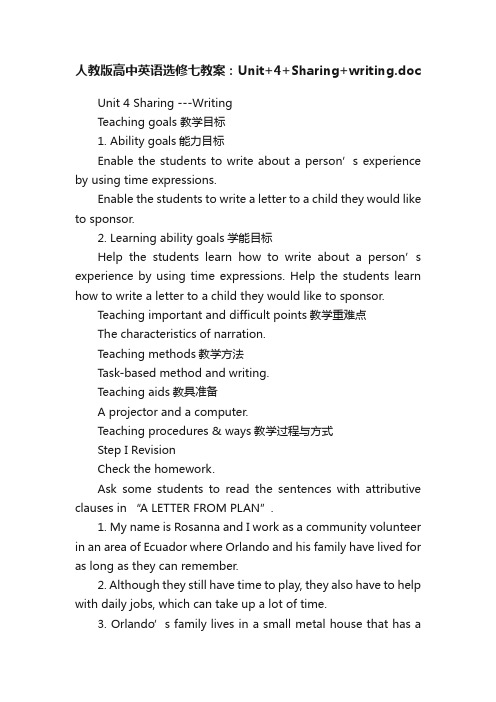
人教版高中英语选修七教案:Unit+4+Sharing+writing.docUnit 4 Sharing ---WritingTeaching goals 教学目标1. Ability goals能力目标Enable the students to write about a person’s experience by using time expressions.Enable the students to write a letter to a child they would like to sponsor.2. Learning ability goals学能目标Help the students learn how to write about a person’s experience by using time expressions. Help the students learn how to write a letter to a child they would like to sponsor.Teaching important and difficult points教学重难点The characteristics of narration.Teaching methods教学方法Task-based method and writing.Teaching aids教具准备A projector and a computer.Teaching procedures & ways教学过程与方式Step I RevisionCheck the homework.Ask some students to read the sentences with attributive clauses in “A LETTER FROM PLAN”.1. My name is Rosanna and I work as a community volunteer in an area of Ecuador where Orlando and his family have lived for as long as they can remember.2. Although they still have time to play, they also have to help with daily jobs, which can take up a lot of time.3. Orlando’s family lives in a small metal house that has astraw roof and a dirt floor.Step Ⅱ Pre-writingT: Let’s reca ll something about Dr Mary Murray, who worked as a volunteer with Medecins Sans Frontieres (MSF). Who’d like to say something about her? Let’s try it this way. Each of you is given the chance to say only one sentence about Dr Mary Murray. OK, begin. Of course, you can have an attributive clause in your sentence.Sa: Dr Mary Murray was a volunteer, who worked with Medecins Sans Frontieres (MSF).Sb: Dr Mary Murray once worked in clinic in both Malawi and Sudan which are developing countries in Africa.…Step Ⅲ WritingT: Very good. Now you are asked to write about Dr Murray for the school magazine. Write a paragraph on each topic below in the order shown. Remember to use time expressions listed on Page 36.1. who she is2. reasons why she joined MSF3. what she did in Malawi4. what she did in the Sudan5. the effects on her of her experiences6. her plans for the futureAfter the students have finished writing, show two samples on the screen and check the mistakes if any.Step Ⅳ Writing taskDeal with WRITING TASK on Page 75.T: Imagine that you have decided to sponsor Shan-shan, a 11-year-old girl from Gansu Province. Her family cannot afford tokeep her at school. But she loves practicing English. Write a letter to her in English. In your letter, you can:Introduce yourselfSay something about your interests and hobbiesDescribe your familyLet her know you want to make friend with her and hear from herOther things you would like to tell herAfter the students have finished writing, ask several of them to read their letters.品味人生1、不管鸟的翅膀多么完美,如果不凭借空气,鸟就永远飞不到高空。
人教版高二英语选修七Unit4 Sharing教案设计
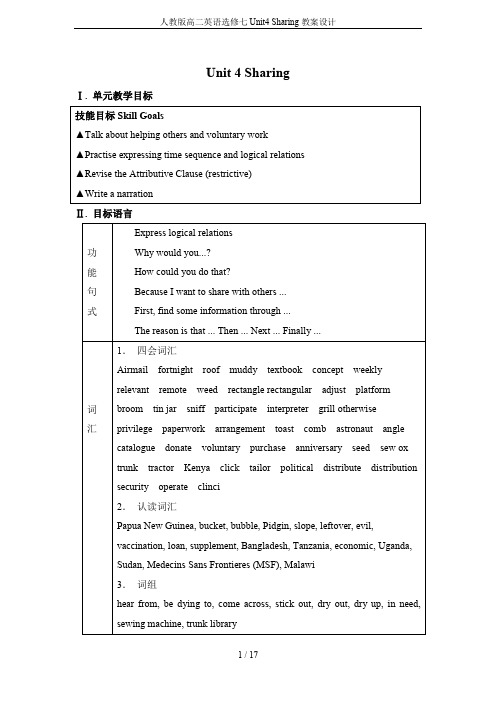
Unit 4 Sharing Ⅰ. 单元教学目标Ⅱ. 目标语言Ⅲ. 教材分析和教材重组1. 教材分析本单元以Sharing为话题,旨在通过单元教学,使学生了解世界上很多地方依然很落后,从而懂得同情,学会分享。
结合针对短文话题的探讨激发学生的国际意识,通过各种渠道力所能及地为贫困地区的孩子做出自己的贡献。
1. 1 Warming Up 提供了三项任务。
通过完成这些任务让学生懂得什么是“帮助”,并且反思自己是否乐于助人,以及怎样做才是“志愿者”,为后面的短文学习做好了铺垫。
1. 2 Pre-reading是Reading的热身活动。
其中介绍了信的作者Jo,还根据她在PNG拍摄的照片提出了5个问题,让学生在阅读之前就对信的内容有了简单的了解。
1. 3 Reading是一篇Jo写给Rosemary的信。
其中Jo介绍了自己在PNG的所见所闻。
读完这封信,学生能感受到PNG的儿童生活之艰难,从而珍惜自己的生活和学习机会。
1. 4 Comprehending是根据短文设计的阅读理解题,检验学生对阅读内容从细节到大意的理解。
1. 5 Learning about Language分词汇和语法两部分。
其中,第一部分是有关此篇短文中出现的重点单词和短语的用法练习;第二部分是对限定性定语从句的复习。
1. 6 Using Language包括三项活动:Reading and speaking以一个有关礼物的网页展开阅读和讨论,通过阅读,学生将了解到这一活动的意义以及他们能为贫困的人做些什么,讨论活动将激发学生对这一主题的深层次思考和参与热情;Listening and speaking通过Jennifer Wells的采访介绍了Mary Murray作为MSF 的一个志愿者的工作经历,而且针对这一话题要求学生能用给出的时间短语结合听力材料谈论Mary Murray;Writing要求学生根据Listening and speaking的话题并运用上面的时间短语写一篇叙述文。
高中英语课件人教版选修7学案B7U4P2
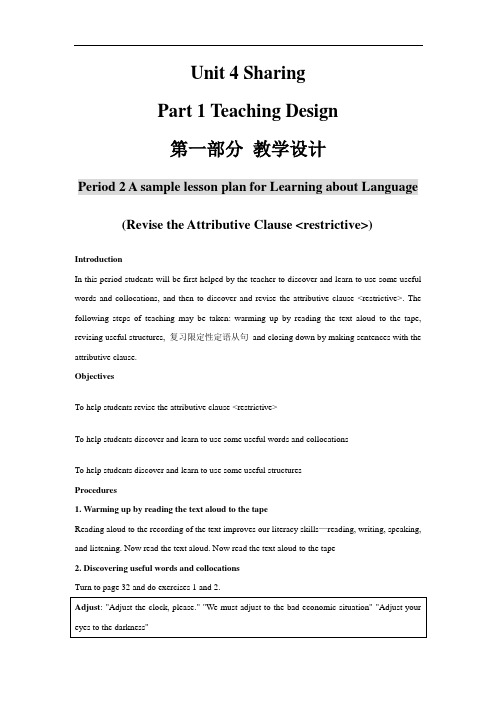
Unit 4 SharingPart 1 Teaching Design第一部分教学设计Period 2 A sample lesson plan for Learning about Language (Revise the Attributive Clause <restrictive>)IntroductionIn this period students will be first helped by the teacher to discover and learn to use some useful words and collocations, and then to discover and revise the attributive clause <restrictive>. The following steps of teaching may be taken: warming up by reading the text aloud to the tape, revising useful structures, 复习限定性定语从句and closing down by making sentences with the attributive clause.ObjectivesTo help students revise the attributive clause <restrictive>To help students discover and learn to use some useful words and collocationsTo help students discover and learn to use some useful structuresProcedures1. Warming up by reading the text aloud to the tapeReading aloud to the recording of the text improves our literacy skills—reading, writing, speaking, and listening. Now read the text aloud. Now read the text aloud to the tape2. Discovering useful words and collocationsTurn to page 32 and do exercises 1 and 2.3. Revising useful structuresNow you may turn to page 32 to do exercises 1. You are to finish the sentence with your own words.Next you are going to do exercise 2 on page 32.4. 复习限定性定语从句一、限定性定语从句中关系代词的用法1.who, whom, that三者都可修饰人,who作主语,whom作宾语,that既可作主语又可作宾语.(1)I don’t like people who lose their tempers easily.我不喜欢爱发脾气的人。
人教版高中英语选修7全册教案(pdf)版

人教版高中英语选修7全册教案Module 7Unit 1 Living wellI.单元教学目标技能目标Goals▲0 Learn about Disability and Life of disabled people▲1 Talk about Disability and Life of disabled people▲2 Practise Introduction and Wishes &congratulations▲3 Revise the Infinitive▲4 Write a letter of suggestionII.目标语言功能句式1.IntroductionI’d like to introduce you to…I’d like you to meet…May I introduce…?Pleased to meet you.It’s nice to meet you.2.Wishes &congratulations Congratulations.All the best.I’m proud of you.I wish you success.Good luck.Well done.I’m very impressed by your performances. You have my best wishes.I’m very pleased for you.I Hope it goes well for you.That’s wonderful/amazing.词汇1. 四会词汇disability, disabled, eyesight, drum, movie, ambition, beneficial, clumsy, adapt, motto, microscope, breath, absence, stupid, fellow, annoy, annoyed, industry, tank, independent, encouragement, conduct, politics, literature, resign, handkerchief, assistance, companion, latter, congratulate, graduation, certificate, architect, basement, elder, elderly, dignity, accessible, bare2. 认读词汇Rada, Barry, Sally, Marty, overhear, Killmanjaro, Qomolangma, admiration, remarkable, Sanders, earphone, impair, italic, community3. 词组in other words, out of breath, all in all, make fun of , all the best, in particular4.重点词汇disability, disabled, adapt, annoy, conduct, congratulate, accessible结构Revise the InfinitiveThe infinitive can be used1. as the subject2. as the predicative,3. as the object4. as the object complement5. as the adverbial6. as the attribute重点句子I have learned to adapt to my disability.Every time after a long absence from school, I feel really stupid because I am a bit behind the others.All in all, I have a good life.Just accept them for whom they are and give them encouragement to live as rich and full a life as you do.III.教材分析与教材重组1.教材分析本单元以残疾及残疾人生活为话题,介绍了一些残疾人凭借顽强的毅力和社会的关爱克服生活中的种种困难,以积极的态度面对人生的挑战。
人教版高中英语选修七教案:Unit+4+Sharing+writing.doc
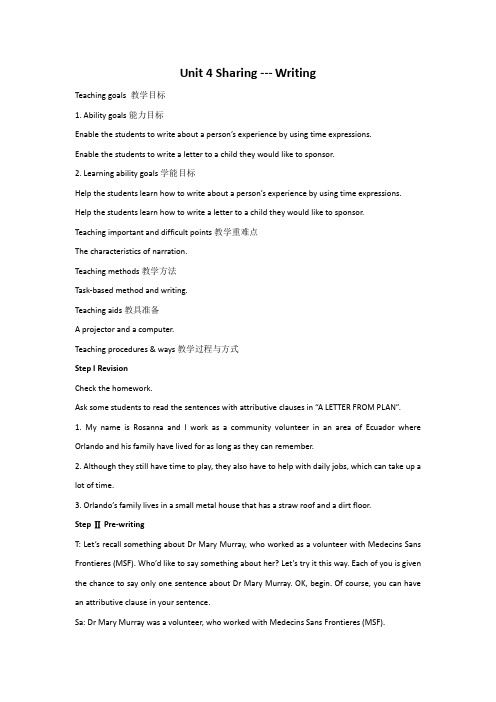
Unit 4 Sharing ---WritingTeaching goals 教学目标1. Ability goals能力目标Enable the students to write about a person’s experience by using time expressions.Enable the students to write a letter to a child they would like to sponsor.2. Learning ability goals学能目标Help the students learn how to write about a person’s experience by using time expressions. Help the students learn how to write a letter to a child they would like to sponsor.Teaching important and difficult points教学重难点The characteristics of narration.Teaching methods教学方法Task-based method and writing.Teaching aids教具准备A projector and a computer.Teaching procedures & ways教学过程与方式Step I RevisionCheck the homework.Ask some students to read the sentences with attributive clauses in “A LETTER FROM PLAN”.1. My name is Rosanna and I work as a community volunteer in an area of Ecuador where Orlando and his family have lived for as long as they can remember.2. Although they still have time to play, they also have to help with daily jobs, which can take up a lot of time.3. Orlando’s family lives in a small metal house that has a straw roof and a dirt floor.Step Ⅱ Pre-writingT: Let’s recall something about Dr Mary Murray, who worked as a volunteer with Medecins Sans Frontieres (MSF). Who’d like to say something about her? Let’s try it this way. Each of you is given the chance to say only one sentence about Dr Mary Murray. OK, begin. Of course, you can have an attributive clause in your sentence.Sa: Dr Mary Murray was a volunteer, who worked with Medecins Sans Frontieres (MSF).Sb: Dr Mary Murray once worked in clinic in both Malawi and Sudan which are developing countries in Africa.…Step Ⅲ WritingT: Very good. Now you are asked to write about Dr Murray for the school magazine. Write a paragraph on each topic below in the order shown. Remember to use time expressions listed on Page 36.1. who she is2. reasons why she joined MSF3. what she did in Malawi4. what she did in the Sudan5. the effects on her of her experiences6. her plans for the futureAfter the students have finished writing, show two samples on the screen and check the mistakes if any.Step Ⅳ Writing taskDeal with WRITING TASK on Page 75.T: Imagine that you have decided to sponsor Shan-shan, a 11-year-old girl from Gansu Province. Her family cannot afford to keep her at school. But she loves practicing English. Write a letter to her in English. In your letter, you can:Introduce yourselfSay something about your interests and hobbiesDescribe your familyLet her know you want to make friend with her and hear from herOther things you would like to tell herAfter the students have finished writing, ask several of them to read their letters.品味人生1、不管鸟的翅膀多么完美,如果不凭借空气,鸟就永远飞不到高空。
人教版高中英语选修7全册教案
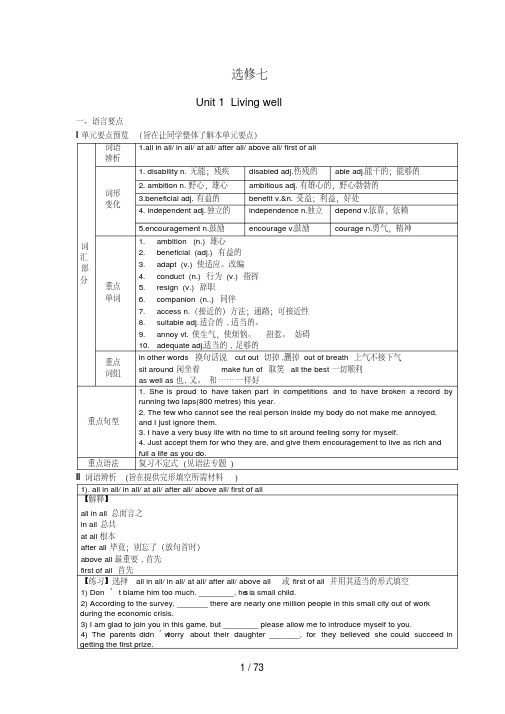
选修七Unit 1 Living well 一、语言要点I单元要点预览(旨在让同学整体了解本单元要点)词汇部分词语辨析1.all in all/ in all/ at all/ after all/ above all/ first of all词形变化1. disability n.无能;残疾disabled adj.伤残的able adj.能干的;能够的2. ambition n.野心,雄心ambitious adj.有雄心的,野心勃勃的3.beneficial adj.有益的benefit v.&n.受益;利益,好处4. independent adj.独立的independence n.独立depend v.依靠,依赖5.encouragement n.鼓励encourage v.鼓励courage n.勇气,精神重点单词1.ambition (n.) 雄心2.beneficial (adj.) 有益的3.adapt (v.) 使适应。
改编4.conduct (n.) 行为 (v.) 指挥5.resign (v.) 辞职panion (n..) 同伴7.access n. (接近的)方法;通路;可接近性8.suitable adj.适合的, 适当的。
9.annoy vt. 使生气,使烦恼。
招惹。
妨碍10.adequate adj.适当的, 足够的重点词组in other words 换句话说 cut out 切掉,删掉 out of breath 上气不接下气sit around 闲坐着 make fun of 取笑 all the best一切顺利as well as 也, 又。
和……一样好重点句型1. She is proud to have taken part in competitions and to have broken a record by running two laps(800 metres) this year.2. The few who cannot see the real person inside my body do not make me annoyed, and I just ignore them.3. I have a very busy life with no time to sit around feeling sorry for myself.4. Just accept them for who they are, and give them encouragement to live as rich and full a life as you do.重点语法复习不定式(见语法专题)II 词语辨析(旨在提供完形填空所需材料)1). all in all/ in all/ at all/ after all/ above all/ first of all【解释】all in all总而言之in all总共at all根本after all毕竟;别忘了(放句首时)above all最重要, 首先first of all首先【练习】选择all in all/ in all/ at all/ after all/ above all或first of all并用其适当的形式填空1) Don’t blame him too much. ________, he i s a small child.2) According to the survey, _______ there are nearly one million people in this small city out of work during the economic crisis.3) I am glad to join you in this game, but ________ please allow me to introduce myself to you.4) The parents didn’t worry about their daughter _______, for they believed she could succeed in getting the first prize.5) When traveling abroad, _______, you need to prepare your passport.6) There are many beautiful sentences in your article and its handwriting i s good too. ________, I’m quite satisfied with it.Keys: 1) After all 2) in all 3) first of all 4) at all 5) above all 6) All in allIII 词性变化(旨在提供语法填空所需材料)1. disability n.无能;残疾disabled adj.伤残的able adj.能干的;能够的2. ambition n.野心,雄心ambitious adj.有雄心的,野心勃勃的3.beneficial adj.有益的benefit v.&n.受益;利益,好处4. independent adj.独立的independence n.独立depend v.依靠,依赖5.encouragement n.鼓励encourage v.鼓励courage n.勇气,精神【练习】根据句子结构,用括号内所提供词的适当形式填空1)The ______ girl swims well in spite of her _______.(disable)2) Robert is a very _______ man and one of his ______ is to travel in Antarctica. (ambition)3) If you want to be a _______, you should work hard at ______ and care for ______ situations. (politics)4) It is known to all that fresh air is _______ to our health and the new park ______ us all, so we shouldkeep it clean.(benefit)5) The boy who used to ______on his parents now wants the ______ from them and is learning to be_______.(depend)6) Praise acts as an ______ to the players, and therefore they will feel ______ and get the _______tocontinue and improve their performance.(encourage)7) My brother ______ from a well-known American university. My parents attended his _______ ceremony yesterday.(graduate)8) When someone ______ others on their success, he or she usually says “_______”.(congratulate)9) This concert was _______ by a famous _______ from Vienna. (conduct)keys:1) disabled。
高中英语课件人教版选修7学案B7U2P2

Unit 2 RobotsPart 1 Teaching Design第一部分教学设计Period 2 A sample lesson plan for Learning about Language (Revise the passive voice including the infinitive)IntroductionIn this period students will be first helped by the teacher to discover and learn to use some useful words and collocations, and then to discover and revise the passive voice including the infinitive. The following steps of teaching may be taken: warming up by having a dictation, discovering useful words and collocations, reading more about the 22nd century, learning about the passive voice, discovering useful structures and closing down by putting on stage a text play of Satisfaction Guaranteed.ObjectivesTo help students revise the passive voiceTo help students discover and learn to use some useful words and collocationsTo help students discover and learn to use some useful structuresProcedures1. Warming up by having a dictationTo begin with, let’s take a dictation to strengthen our memory of the text.2. Discovering useful words and collocationsA collocation is two or more words that often go together. These combinations just sound "right" to native English speakers, who use them all the time.While going over the text, try to recognize the collocations, treat them as single blocks of language and copy them out into your Collocation Book.Now go to page 13. Work in pairs to finish the three exercises in 10 minutes.3. Learning about the passive voiceACTIVE AND PASSIVE TENSES CHART4. 被动语态小结●被动语态的特殊结构形式1)带情态动词的被动结构。
高中英语选修7(全册)教(学)案
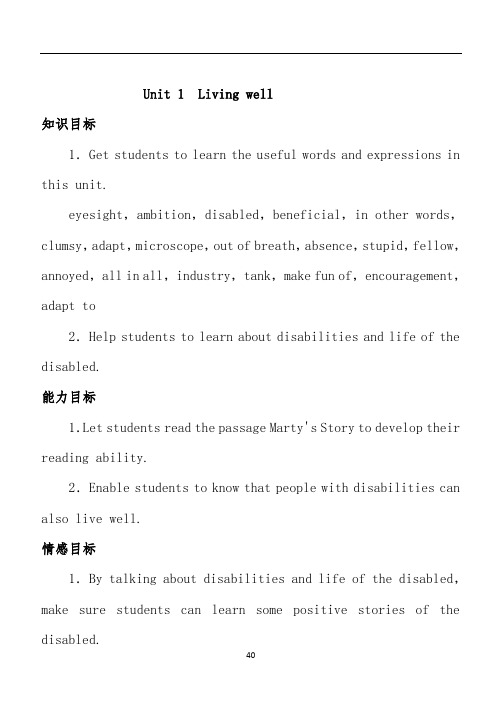
Unit 1 Living well知识目标1.Get students to learn the useful words and expressions in this unit.eyesight,ambition,disabled,beneficial,in other words,clumsy,adapt,microscope,out of breath,absence,stupid,fellow,annoyed,all in all,industry,tank,make fun of,encouragement,adapt to2.Help students to learn about disabilities and life of the disabled.能力目标1.Let students read the passage Marty's Story to develop their reading ability.2.Enable students to know that people with disabilities can also live well.情感目标1.By talking about disabilities and life of the disabled,make sure students can learn some positive stories of the disabled.2.Help them understand more about how challenging life can be for the disabled.3.Develop students' sense of cooperative learning.教学重点Get students inspired by positive stories of the people with disabilities.教学难点1.Develop students' reading ability.2.Help students understand the difficulties the disabled have to overcome.学情分析1.教学方法1.Task-based teaching and learning.2.Cooperative learning.教学过程Step 1Warming up1.Warming up by discussingFirst ask students to talk about people with a mental or physical disability to see how much they know about disabilities. Then show some photos of people with disabilities. Students will be asked to discuss the following questions in small groups.Do you know any famous people who are disabled?What difficulties do they have to overcome in daily life?What have they achieved?2.Warming up by talkingFirst,ask students to look at the pictures and read what these people have achieved even though they each have a disability. Next,work with partners to talk about what disability they might have according to each description below the picture.Step 2Pre-readingAsk students to read the short paragraph in Pre-reading carefully and find out the purpose of the website “Family Village”.Step 3Reading1.SkimmingGive students 2 minutes;ask them to read the passage fastto fill in the blanks:Sum up the main idea of each paragraph:Paragraph 1:A(n)______ to Marty and his muscle disease.Paragraph 2:How the disease ______.Paragraph 3:Marty met a lot of ______ at school.Paragraph 4:How his life has become ______.Paragraph 5:The ______ of his disease.Suggested answers:Paragraph 1:An introduction to Marty and his muscle disease.Paragraph 2:How the disease developed/started.Paragraph 3:Marty met a lot of difficulties at school.Paragraph 4:How his life has become easier.Paragraph 5:The advantages of his disease.2.Scanning for detailed informationAsk students to read the passage carefully to locate the detailed information.(1)First ask students to read paragraph one and complete the chart below.DifficultiesMottoSuggested answers:Disease A muscle disease that makes him very weak.DifficultiesHe can't run or climb stairs as quickly as other people. Sometimes he is clumsy and drop things or bumpinto furniture.Motto Live one day at a time.(2)Next read paragraphs two and three and choose the best answer.Why did the doctors cut out a piece of muscle from Marty's leg?A.Because they could cure the disease by cutting it out.B.Because they wanted to use it as a specimen(标本).C.Because they would transplant(移植) the new muscle.D.Because they wanted to find out the cause of the disease.Key:D(3)Read paragraph four and answer the following questions:①What is Marty's ambition?②What is Marty's achievement?③What is Marty's hobby?(4)Ask students to find Marty's advice in paragraph five.Step4:合作探究1.Ask students to work together to write a mini biography for Marty according to the text.My minibiographyNameStatusHealthInterests andHobbiesAmbitionMotto2.Discuss in pairs to get the main idea of the passage by filling in the blanks.Though he is a ______ person,Marty never feels ______ forhimself and he ______ his life.Step 5 总结提升1.Ask students to read the whole passage and choose the best answers.(1)Which of the following is false?A.Although there are a few students who look down upon him,Marty never gets annoyed.B.Marty leads a meaningful life and does not feel sorry for being disabled.C.Marty only spends time with his pets and never with his friends.D.Marty's disability has made him more independent.(2)From the passage we can infer that ______.A.Marty asks others to feel sorry for himB.Marty never loses heartC.Marty is afraid of being made fun ofD.Marty will not accept any encouragement because he has grown stronger psychologicallyStep 6 Homework1.Retell Marty's Story according to the mini biography.2.Surf the Internet to learn more about the life of disabled people.教学反思:这篇文章是记叙文,对文章的整体理解不存在问题,不足之处是单词不熟。
人教高中英语选修七:Unit+4教案.doc
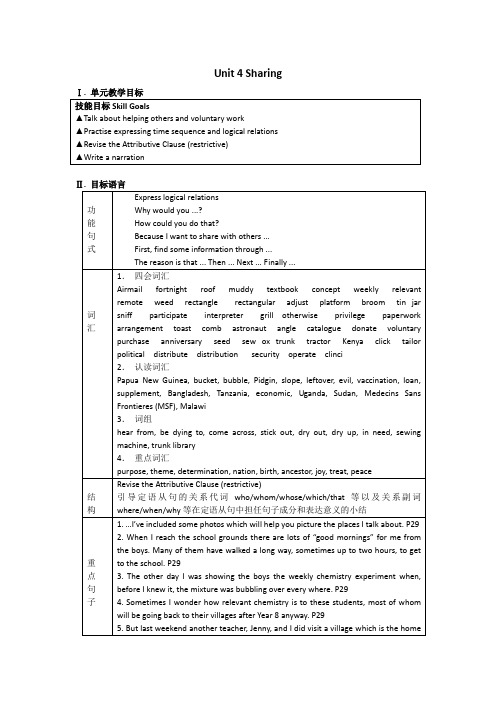
Unit 4 SharingⅡ. 目标语言Ⅲ. 教材分析和教材重组1. 教材分析本单元以Sharing为话题,旨在通过单元教学,使学生了解世界上很多地方依然很落后,从而懂得同情,学会分享。
结合针对短文话题的探讨激发学生的国际意识,通过各种渠道力所能及地为贫困地区的孩子做出自己的贡献。
1. 1 Warming Up 提供了三项任务。
通过完成这些任务让学生懂得什么是“帮助”,并且反思自己是否乐于助人,以及怎样做才是“志愿者”,为后面的短文学习做好了铺垫。
1. 2 Pre-reading是Reading的热身活动。
其中介绍了信的作者Jo,还根据她在PNG拍摄的照片提出了5个问题,让学生在阅读之前就对信的内容有了简单的了解。
1. 3 Reading是一篇Jo写给Rosemary的信。
其中Jo介绍了自己在PNG的所见所闻。
读完这封信,学生能感受到PNG的儿童生活之艰难,从而珍惜自己的生活和学习机会。
1. 4 Comprehending是根据短文设计的阅读理解题,检验学生对阅读内容从细节到大意的理解。
1. 5 Learning about Language分词汇和语法两部分。
其中,第一部分是有关此篇短文中出现的重点单词和短语的用法练习;第二部分是对限定性定语从句的复习。
1. 6 Using Language包括三项活动:Reading and speaking以一个有关礼物的网页展开阅读和讨论,通过阅读,学生将了解到这一活动的意义以及他们能为贫困的人做些什么,讨论活动将激发学生对这一主题的深层次思考和参与热情;Listening and speaking通过Jennifer Wells的采访介绍了Mary Murray作为MSF的一个志愿者的工作经历,而且针对这一话题要求学生能用给出的时间短语结合听力材料谈论Mary Murray;Writing要求学生根据Listening and speaking的话题并运用上面的时间短语写一篇叙述文。
- 1、下载文档前请自行甄别文档内容的完整性,平台不提供额外的编辑、内容补充、找答案等附加服务。
- 2、"仅部分预览"的文档,不可在线预览部分如存在完整性等问题,可反馈申请退款(可完整预览的文档不适用该条件!)。
- 3、如文档侵犯您的权益,请联系客服反馈,我们会尽快为您处理(人工客服工作时间:9:00-18:30)。
株潭中学集体备课教案单
精美句子
1、善思则能“从无字句处读书”。
读沙漠,读出了它坦荡豪放的胸怀;读太阳,读出了它普照万物的无私;读春雨,读出了它润物无声的柔情。
读大海,读出了它气势磅礴的豪情。
读石灰,读出了它粉身碎骨不变色的清白。
2、幸福幸福是“临行密密缝,意恐迟迟归”的牵挂;幸福是“春种一粒粟,秋收千颗子”的收获. 幸福是“采菊东篱下,悠然见南山”的闲适;幸福是“奇闻共欣赏,疑义相与析”的愉悦。
幸福是“随风潜入夜,润物细无声”的奉献;幸福是“夜来风雨声,花落知多少”的恬淡。
幸福是“零落成泥碾作尘,只有香如故”的圣洁。
幸福是“壮志饥餐胡虏肉,笑谈渴饮匈奴血”的豪壮。
幸福是“先天下之忧而忧,后天下之乐而乐”的胸怀。
幸福是“人生自古谁无死,留取丹心照汗青”的气节。
3、大自然的语言丰富多彩:从秋叶的飘零中,我们读出了季节的变换;从归雁的行列中,我读出了集体的力量;从冰雪的消融中,我们读出了春天的脚步;从穿石的滴水中,我们读出了坚持的可贵;从蜂蜜的浓香中,我们读出了勤劳的甜美。
4、成功与失败种子,如果害怕埋没,那它永远不能发芽。
鲜花,如果害怕凋谢,那它永远不能开放。
矿石,如果害怕焚烧(熔炉),那它永远不能成钢(炼成金子)。
蜡烛,如果害怕熄灭(燃烧),那它永远不能发光。
航船,如果害怕风浪,那它永远不能到达彼岸。
5、墙角的花,当你孤芳自赏时,天地便小了。
井底的蛙,当你自我欢唱时,视野便窄了。
笼中的鸟,当你安于供养时,自由便没了。
山中的石!当你背靠群峰时,意志就坚了。
水中的萍!当你随波逐流后,根基就没了。
空中的鸟!当你展翅蓝天中,宇宙就大了。
空中的雁!当你离开队伍时,危险就大了。
地下的煤!你燃烧自己后,贡献就大了
6、朋友是什么?
朋友是快乐日子里的一把吉它,尽情地为你弹奏生活的愉悦;朋友是忧伤日子里的一股春风,轻轻地为你拂去心中的愁云。
朋友是成功道路上的一位良师,热情的将你引向阳光的地带;朋友是失败苦闷中的一盏明灯,默默地为你驱赶心灵的阴霾。
7、一粒种子,可以无声无息地在泥土里腐烂掉,也可以长成参天的大树。
一块铀块,可以平庸无奇地在石头里沉睡下去,也可以产生惊天动地的力量。
一个人,可以碌碌无为地在世上厮混日子,也可以让生命发出耀眼的光芒。
8、青春是一首歌,她拨动着我们年轻的心弦;青春是一团火,她点燃了我们沸腾的热血;青春是一面旗帜,她召唤着我们勇敢前行;青春是一本教科书,她启迪着我们的智慧和心灵。
